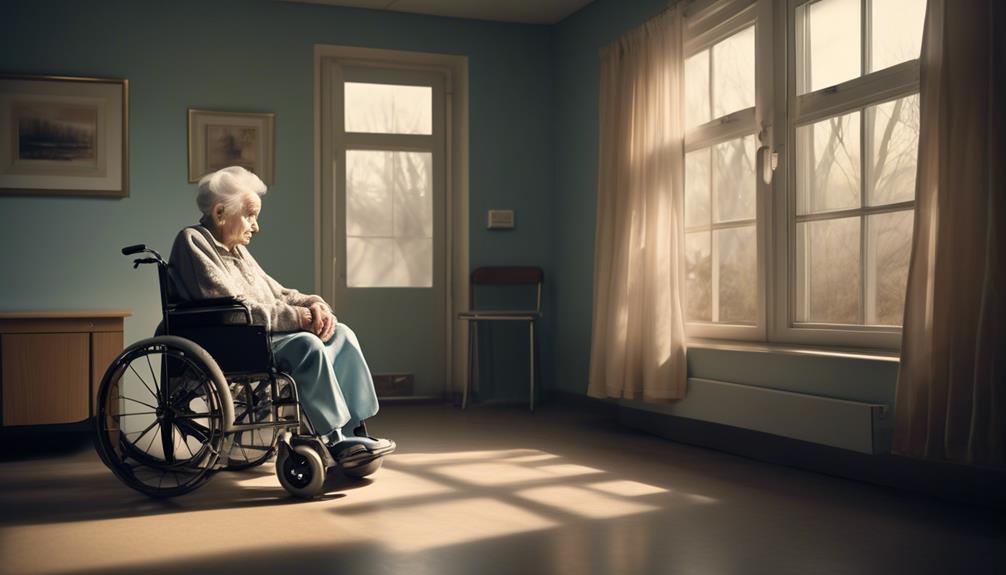Finding a note from 1991 that ponders the idea of residing in a hospital post-death prompts us to contemplate deeply on the final moments of life.
The profound musings captured in these words offer a glimpse into the inner workings of a mind grappling with the intersection of mortality and healthcare settings.
As we ponder the implications of such a message, we are left wondering about the individual behind these poignant words and the journey that led them to express such reflections on their potential future.
Key Takeaways
- Aging uncertainties prompt future care planning.
- Hospitalization vital for specialized senior care.
- End-of-life considerations require communication and planning.
- Note emphasizes discussing end-of-life preferences early.
Uncovering the Heartfelt Note
Upon discovery, the note from 1991 revealed profound apprehensions about residing in a hospital setting. The writer expressed fears about the end of life and the possibility of needing palliative care in a hospital. The note hinted at the writer’s wish for control over their medical decisions, possibly indicating a desire for an advance directive to guide their care.
The emotions conveyed in the note underscore the importance of addressing end-of-life preferences early on. It serves as a poignant reminder of the significance of hospice care and the need for individuals to have their wishes respected during such vulnerable times. The note’s message resonates with the complexities of aging and the uncertainties that come with it.
Reflections on Aging and Uncertainties

Aging brings forth a myriad of uncertainties, encompassing health, independence, and future arrangements. As individuals age, the prospect of hospitalization becomes a looming possibility, prompting reflections on potential end-of-life decisions and living situations. The note from ’91 reflects the writer’s contemplation about the likelihood of requiring hospital care in the future. This contemplation hints at a deep awareness of the aging process and the uncertainties it brings, especially regarding health and living arrangements.
Uncertainties surrounding aging can lead individuals to consider their options for future care and support. The note serves as a poignant reminder of the inevitable changes that come with age and the need to plan for potential hospitalization or other health challenges. By acknowledging these uncertainties, individuals can make informed decisions about their end-of-life preferences and arrangements, ensuring that their needs are met with dignity and respect as they navigate the complexities of aging.
Navigating Health Challenges in Seniors
When seniors encounter health challenges, the need for specialized care and medical interventions often necessitates hospitalization to address their complex conditions effectively. Hospitalization provides a controlled environment where seniors can receive individualized care tailored to their specific needs. For elderly individuals facing acute or chronic health issues, a hospital stay allows for comprehensive monitoring, treatment, and symptom management. This level of care ensures that seniors receive the attention required to manage their conditions and promote recovery.
In the hospital setting, a multidisciplinary approach involving doctors, nurses, therapists, and other healthcare professionals is crucial in providing holistic care for seniors. Additionally, collaboration with the hospice team may be necessary for individuals requiring End-of-Life Care. Close coordination between healthcare providers, seniors, and their families is essential to ensure that the senior’s health challenges are addressed effectively during their hospital stay. By focusing on symptom management and delivering personalized care, hospitals play a vital role in supporting seniors through their healthcare journey.
End-of-Life Considerations and Living Arrangements

In addressing the complex considerations surrounding end-of-life care, it becomes paramount to carefully evaluate and align living arrangements with the patient’s preferences and needs. When determining the types of care needed for patients with chronic conditions, it is crucial to respect the individual’s wishes regarding where they wish to spend their final days. This table outlines key considerations for end-of-life care:
| Living Arrangement | Description | Examples |
|---|---|---|
| Home Care | Medical care provided in the patient’s own residence | Home health services |
| Hospice Care | Comfort-focused care for terminally ill individuals | Pain management, emotional support |
| Hospital Care | Care provided in a medical facility setting | Intensive medical interventions |
| Nursing Home Care | Long-term care facility for individuals with complex needs | 24-hour skilled nursing care |
Proper communication and planning are essential in ensuring that the patient’s wishes are respected, and the appropriate type of care is provided based on their medical condition and personal preferences. By understanding and implementing these considerations, healthcare professionals can support patients in their end-of-life journey effectively.
Impact of the Discovered Message
Upon analyzing the contents of the discovered note from ’91, it reveals significant apprehensions regarding prolonged hospitalization for the deceased individual. This insight into the deceased’s concerns sheds light on their potential fears and preferences regarding end-of-life care. Understanding the message found after their passing can offer valuable guidance in honoring their wishes and addressing any unresolved issues that may have impacted their final days.
The discovery of this note underscores the importance of clear communication and advance care planning for patients and their families. It serves as a reminder of the significance of discussing end-of-life preferences in advance to ensure that individuals receive care aligned with their values and desires. This newfound information may prompt discussions about hospice care, quality of life, and creating a supportive environment for individuals nearing the end of their lives. By delving into the implications of this message, we can strive to provide compassionate and personalized care that respects the wishes of those we serve.
Frequently Asked Questions
What Happens if Your Patient Dies?
If our patient dies, we ensure a dignified and respectful handling of their passing. We follow established protocols for pronouncement of death, notify appropriate parties, and provide support to the patient’s loved ones.
Documentation and post-mortem care are meticulously completed. We strive to honor their wishes and maintain a compassionate approach throughout the process, acknowledging the significance of this transition for all involved.
Does Medicare Cover Hospital Bills After Death?
We can understand that Medicare coverage ends at a person’s death, leaving any hospital bills incurred after their passing to be handled by the deceased’s estate. This posthumous responsibility often falls on family members or the estate to settle these expenses.
Medicare is designed to assist with medical costs during one’s lifetime, not extending coverage to hospital bills after death. It’s crucial for families to be aware of this financial responsibility posthumously.
Will a Hospital Tell You Over the Phone if Someone Died?
Yes, hospitals typically don’t disclose death information over the phone. Instead, they require in-person verification of identity to share news of a loved one’s passing. This process may involve confirming personal details or requesting official documentation.
Such protocols are in place to uphold privacy and dignity. Families are advised to contact the hospital directly or visit in person for official information regarding a loved one’s death.
What Do Nurses Say When Someone Dies?
When someone dies, we nurses offer condolences, explain next steps, provide emotional support, and facilitate grief counseling.
We assist with post-mortem care respectfully, documenting the time and circumstances of death in the medical records.
This compassionate approach helps families navigate the difficult process of losing a loved one.
Conclusion
In uncovering the poignant note, we’re reminded of the complexities and uncertainties that come with aging and end-of-life considerations.
The message serves as a powerful reflection of the realities many face as they navigate health challenges and living arrangements in their later years.
It’s a stark reminder of the emotional and practical decisions that must be made, prompting us to contemplate our own journey towards the inevitable.









